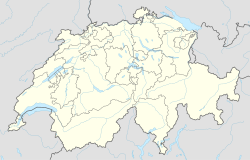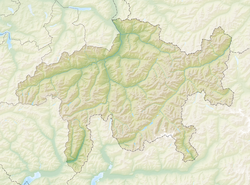Jenins (Romansh: Gianin) is a municipality in the Landquart Region in the Swiss canton of Graubünden.
Jenins | |
|---|---|
 | |
| Coordinates: 47°0′N 9°33′E / 47.000°N 9.550°E | |
| Country | Switzerland |
| Canton | Graubünden |
| District | Landquart |
| Government | |
| • Mayor | Gemeindepräsident Baseli Werth (as of 2014) |
| Area | |
| • Total | 10.54 km2 (4.07 sq mi) |
| Elevation | 635 m (2,083 ft) |
| Highest elevation (Vilan) | 2,376 m (7,795 ft) |
| Population (31 December 2018)[2] | |
| • Total | 886 |
| • Density | 84/km2 (220/sq mi) |
| Time zone | UTC+01:00 (Central European Time) |
| • Summer (DST) | UTC+02:00 (Central European Summer Time) |
| Postal code(s) | 7307 |
| SFOS number | 3952 |
| ISO 3166 code | CH-GR |
| Surrounded by | Maienfeld, Malans, Seewis im Prättigau |
| Website | www SFSO statistics |
History
editJenins is first mentioned in 1139 as Uienennes. In 1142 it was mentioned as Gininnes.[3]
Geography
editJenins has an area, as of 2006[update], of 10.5 km2 (4.1 sq mi). Of this area, 48% is used for agricultural purposes, while 40.1% is forested. Of the rest of the land, 3.6% is settled (buildings or roads) and the remainder (8.3%) is non-productive (rivers, glaciers or mountains).[4]
Before 2017, the municipality was located in the Maienfeld sub-district of the Landquart district, after 2017 it was part of the Landquart Region.
Demographics
editJenins has a population (as of 31 December 2020) of 915.[5] As of 2008[update], 10.6% of the population was made up of foreign nationals.[6] Over the last 10 years the population has grown at a rate of 8.6%. Most of the population (as of 2000[update]) speaks German (93.8%), with Romansh being second most common ( 1.2%) and English being third ( 0.9%).[4]
As of 2000[update], the gender distribution of the population was 49.1% male and 50.9% female.[7] The age distribution, as of 2000[update], in Jenins is; 107 children or 14.3% of the population are between 0 and 9 years old. 48 teenagers or 6.4% are 10 to 14, and 35 teenagers or 4.7% are 15 to 19. Of the adult population, 71 people or 9.5% of the population are between 20 and 29 years old. 134 people or 18.0% are 30 to 39, 118 people or 15.8% are 40 to 49, and 91 people or 12.2% are 50 to 59. The senior population distribution is 60 people or 8.0% of the population are between 60 and 69 years old, 51 people or 6.8% are 70 to 79, there are 26 people or 3.5% who are 80 to 89, and there are 5 people or 0.7% who are 90 to 99.[6]
In the 2007 federal election the most popular party was the SVP which received 40.7% of the vote. The next three most popular parties were the SP (22.5%), the FDP (20.4%) and the CVP (13.4%).[4]
In Jenins about 77.4% of the population (between age 25-64) have completed either non-mandatory upper secondary education or additional higher education (either university or a Fachhochschule).[4]
Jenins has an unemployment rate of 0.68%. As of 2005[update], there were 107 people employed in the primary economic sector and about 29 businesses involved in this sector. 35 people are employed in the secondary sector and there are 8 businesses in this sector. 107 people are employed in the tertiary sector, with 14 businesses in this sector.[4]
The historical population is given in the following table:[3][7]
| year | population |
|---|---|
| 1850 | 481 |
| 1900 | 450 |
| 1950 | 461 |
| 1960 | 398 |
| 1970 | 468 |
| 1980 | 557 |
| 1990 | 654 |
| 2000 | 746 |
Heritage sites of national significance
editNeu-Aspermont Castle is listed as a Swiss heritage site of national significance.[8]
-
Sketch of Neu-Aspermont
-
Layout of Castle Neu-Aspermont
-
Neu-Aspermont from the west
-
Interior of the living quarters
Sights
editThe Greisinger Museum houses the Greisinger Collection, Bernd Greisinger's private collection focused on J. R. R. Tolkien's Middle-earth. The collection, consists primarily of art and literature and collectors' items of any kind. It opened on 4 October 2013. The museum is a non-profit foundation. The main entrance is a round hobbit door and many of the rooms are underground.
The construction of the museum started in mid-2008. Planning and building of the museum were orientated on optimizing the use of the Greisinger Collection.
References
edit- ^ a b "Arealstatistik Standard - Gemeinden nach 4 Hauptbereichen". Federal Statistical Office. Retrieved 13 January 2019.
- ^ "Ständige Wohnbevölkerung nach Staatsangehörigkeitskategorie Geschlecht und Gemeinde; Provisorische Jahresergebnisse; 2018". Federal Statistical Office. 9 April 2019. Retrieved 11 April 2019.
- ^ a b Jenins in German, French and Italian in the online Historical Dictionary of Switzerland.
- ^ a b c d e Swiss Federal Statistical Office Archived 2016-01-05 at the Wayback Machine accessed 16-Oct-2009
- ^ "Ständige und nichtständige Wohnbevölkerung nach institutionellen Gliederungen, Geburtsort und Staatsangehörigkeit". bfs.admin.ch (in German). Swiss Federal Statistical Office - STAT-TAB. 31 December 2020. Retrieved 21 September 2021.
- ^ a b Graubunden Population Statistics Archived 2009-08-27 at the Wayback Machine (in German) accessed 21 September 2009
- ^ a b Graubunden in Numbers Archived 2009-09-24 at the Wayback Machine (in German) accessed 21 September 2009
- ^ Swiss inventory of cultural property of national and regional significance Archived 2009-05-01 at the Wayback Machine 21.11.2008 version, (in German) accessed 16-Oct-2009



